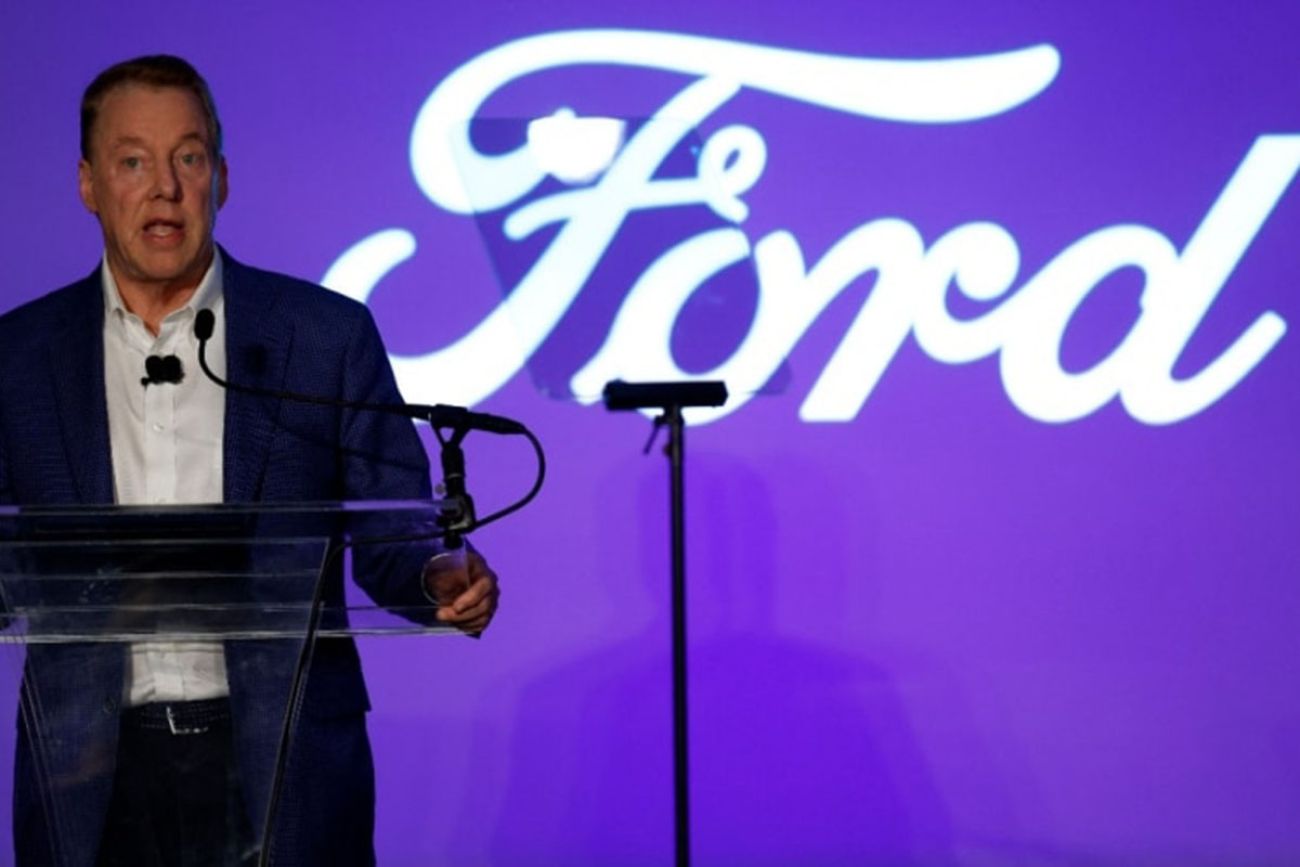UAW strike impact grows in Michigan as walkouts enter second month

- Each of the three Detroit automakers still has ‘thorny issues’ to resolve with the union
- Bill Ford, Jr. made a personal appeal to UAW workers, saying the union needs to fight against outside companies, not with each other
- The economic cost of the strike is close to $8 billion, according to the latest estimates
Oct. 30: UAW strike ends: Higher pay, more EV worries, tighter margins for Big Three
Oct. 26: UAW-Ford deal hints at fine line Detroit Three must walk on labor costs
Over 9,000 workers at General Motors, Ford Motor Co. and Stellantis are walking picket lines in Michigan as the United Auto Workers strike entered its second month Sunday.
The impact of the walkouts affects thousands more workers across the state and U.S., with about 34,000 of the 150,000 hourly workers on strike at the so-called Detroit Three.
The strike’s duration prompted Bill Ford Jr. to urge the union to settle the strike as the national economic costs climb into the billions and related industries — including the auto supplier network, which has a heavy presence across Michigan — are feeling the fallout more acutely.
Related:
- UAW strike 2023 updates
- UAW strike sets Michigan on uncertain path: ‘We’re nervous’
- Strike likely; UAW plans staggered walkouts to ‘keep companies guessing’
- As UAW strike looms, what to know about contract talks, Big Three finances
- UAW strike against the Big Three: A timeline of historic 2023 work action
“It’s pretty clear that the longer this goes, it’s really not good for our state,” said Andy Johnston, vice president of government affairs for the Grand Rapids Area Chamber.
Here are four things to know about the strike at the start as it enters its second month:
Unionizing EV workers a major sticking point
Elements of an agreement are in place across all three auto companies, Marick Masters, a business professor at Wayne State University told Bridge Michigan Monday.

“But,” he added, “there are some thorny issues to sort out and progress is uneven across the companies.”
Three key issues remain in among the union’s demands, he said:
- The union status of workers in automakers’ joint ventures that produce electric vehicle batteries.
- Wages, with the automakers proposing around 20 percent increases over four years and the UAW demanding 36 percent.
- Retiree security, including restored health care benefits and pensions.
While wages and retiree negotiations seem to be closer to resolution, particularly at GM and Stellantis, Masters said the EV battery plant issue may be the most difficult to resolve.
Reaching a contract, he said, “is going to depend on how flexible the companies are about … the joint ventures.”
Most of the automakers’ EV battery plants in the U.S., including GM’s Ultium Cells in Delta Township near Lansing, are partnerships with non-union Asian battery-makers. They were announced with lower pay rates due to workers not being covered by UAW contracts.
However, the UAW claims that GM offered to have its battery employees work under union contracts, and Masters said the pressure is high for Stellantis and Ford to follow suit.
For automakers, that likely means higher costs to make the batteries than those of non-U.S. automakers and EV-only manufacturers, like Tesla.
“The forces that set the (pay) pattern in the industry are the non-union producers,” Masters said about EV battery plants. “And they’re dragging down (average wages). What the UAW is hoping to do is to instead pull wages up.”
In order for this strategy to work, he added, the Detroit automakers will need to be successful with EVs and the UAW will need to organize at other auto manufacturers.
Who is the enemy?
Bill Ford Jr. made his first statement about the strike on Monday, speaking in a live video from Ford’s historic Rouge Center in Dearborn.
Ford, the company’s executive chairman and great-grandson of company founder Henry Ford, urged the UAW to settle the strike so the automaker could move forward alongside the union, which he described as friends and partners over many years.
Ford also did not accept UAW President Shawn Fain’s characterization of the Detroit automakers as an enemy in the contract battle. He noted that Ford builds its F-series trucks in the U.S. and that it’s committed to American manufacturing despite competition.
“It should be Ford and the UAW against Toyota, Honda, Tesla and all the Chinese companies that want to enter our home market,” Ford said. “Toyota, Honda, Tesla and the others are loving the strike, because they know the longer it goes on, the better it is for them.”
Ford, GM and Stellantis — today’s owner of Chrysler — had 90 percent of U.S. automotive market share in the 1960s, and 75 percent in the late 1980s.
Today, the Detroit-area automakers have a combined 40 percent market share as they and other global auto companies shift their platforms to electric vehicles. As a result, experts say, the competitive field will shift yet again.
“We are at a crossroads,” Ford said. “Choosing the right path isn’t just about Ford's future and our ability to compete. This is about the future of the American automobile industry.”
Masters, the Wayne State business professor, called Ford’s message “a diplomatic statement.”
“I think it spoke to his genuine concern for workers and a desire to have a good relationship with the UAW. And I think that's what he wants his legacy to be,” Masters said.
But Fain, who wore a T-shirt during a recent video presentation that read, “Eat the Rich,” criticized Ford.
“Bill Ford knows exactly how to settle this strike,” Fain said in a statement. “Instead of threatening to close the Rouge, he should call up (Ford President) Jim Farley, tell him to stop playing games and get a deal done, or we’ll close the Rouge for him.
“It's not the UAW and Ford against foreign automakers. It's autoworkers everywhere against corporate greed. If Ford wants to be the all-American auto company, they can pay all-American wages and benefits. Workers at Tesla, Toyota, Honda, and others are not the enemy. They're the UAW members of the future."
As chairman, Ford’s total compensation was $17.3 million in 2022, according to a report in the Detroit News. That was down from $18.7 million in 2021.
Financial impact of the strike is growing
The cumulative economic impact of the strike across the U.S. reached $7.7 billion as of last Thursday, according to estimates by Anderson Economic Group (AEG) of East Lansing.
Those losses, AEG says, include:
- Direct automaker wages: $359 million
- Detroit 3 revenue: $3.45 billion
- Supplier wages and earnings: $2.67 billion
- Other impact, including auto dealers: $1.21 billion
Patrick Anderson, principal at AEG, said the costs of the strike are spreading through the economy, including “increasing layoffs among vulnerable suppliers.” He called the fifth week of the strike a “danger zone” for suppliers that have been forced to pause work and may not have the capital to restart production without assistance.
Layoffs also are spreading among the Detroit automakers as work in plants dries up due to production halts by the walkouts. The total includes another 239 workers at several Ford plants — including Sterling (Heights) Axle and Dearborn Stamping — who were told not to report to work on Monday.
Beyond that, retail sales and airline travel also have declined, Anderson said. Both are signs that spending cutbacks may be taking place among salaried workers and non-auto related businesses.
Balance sheets may favor automakers
An analysis released Monday by the Morningstar Inc. financial services firm said the UAW will be at a disadvantage if the strike continues.
“The UAW appears to be winning because (the strike) has automakers raising their offers, but we don’t believe the math is on the union’s side if the strike keeps increasing in headcount and duration,” David Whiston, an industrials strategist for Morningstar Research Services LLC, wrote.
“We believe the question of which side will give in first will be decided by whether the automakers are willing to take on debt to wait out the union’s strike fund.”
Morningstar estimated the UAW strike fund — which was at about $825 million at the start of the strike — is now down to about $775 million. That is enough to last just over eight months, if the automakers continue to pay health insurance for striking workers.
The fund would last until the end of the year if all workers strike, Whiston said.
However, GM has about $45 billion in credit lines and Ford has access to about $51 billion. As a result, Whiston wrote, “we estimate that GM could wait out the union for nearly seven months, while Ford could wait for just over 10 months.”
Meanwhile, the stock market impact for Detroit automakers is mixed. GM stock traded at $30.13 at midday Monday, after falling to its year-long low of $29.66 on Friday. Ford was up about 2 percent for the year at the same time, while Stellantis was up 36 percent. In comparison, the Dow Jones Industrial Average of top U.S. stocks was up 2.6 percent year to date.
GM reports third-quarter earnings on Oct. 24, and Ford reports on Oct. 26.
Business Watch
Covering the intersection of business and policy, and informing Michigan employers and workers on the long road back from coronavirus.
- About Business Watch
- Subscribe
- Share tips and questions with Bridge Business Editor Paula Gardner
Thanks to our Business Watch sponsors.
Support Bridge's nonprofit civic journalism. Donate today.
See what new members are saying about why they donated to Bridge Michigan:
- “In order for this information to be accurate and unbiased it must be underwritten by its readers, not by special interests.” - Larry S.
- “Not many other media sources report on the topics Bridge does.” - Susan B.
- “Your journalism is outstanding and rare these days.” - Mark S.
If you want to ensure the future of nonpartisan, nonprofit Michigan journalism, please become a member today. You, too, will be asked why you donated and maybe we'll feature your quote next time!




